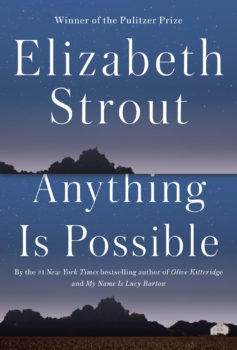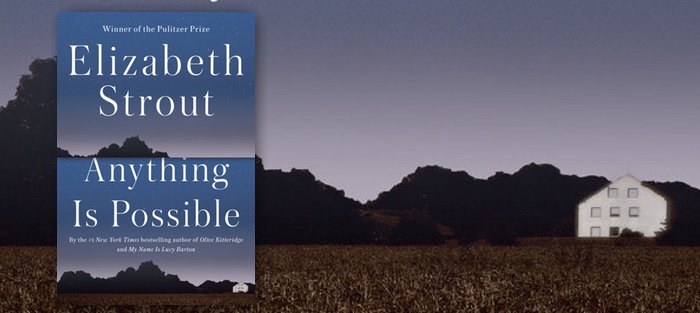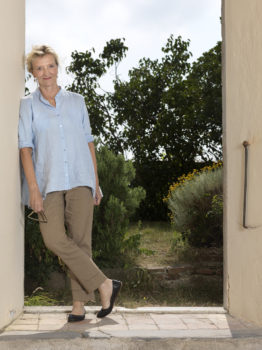“We long to be confided in,” the fellow resident at an artists’ colony said over the breakfast table, reflecting on why the piece we’d heard read the night before had worked so well. Most times, as people, as writers, as readers, we do like to feel included, to be offered at least enough clues to discern the backstory. Secrets and confessions are big-time sellers in the checkout line at the grocery store. In conversation, in our reading and our writing, we like to be tantalized, caught on the hook of the tension between privacy and disclosure.
 A plentitude of secrets and confidences, the complex interlocking personal histories and back stories of a whole community are shared in Elizabeth Strout’s Anything is Possible (Random House, 2017), a collection of linked short stories, a composite narrative of connected and interconnected parts. Most are set in or near the bleak prairie town of Amagash, Illinois which readers of Strout’s 2016 novel My Name Is Lucy Barton will recognize as the place successful New York novelist Lucy Barton grew up in and escaped (until falling ill and falling prey to a long bedside visit from her mother in the earlier book). Readers of Lucy Barton had hints of what Lucy fled. In Anything is Possible, Lucy’s siblings and the community reveal all—well, a great deal. Here Strout turns the premise of the earlier book around—now Lucy’s visiting her past, instead of her past (her mother) coming to visit. She’s on a book tour, in Chicago, close enough to Amagash for a now successful cousin living in the metropolitan area to hear her read at a bookstore, close enough to Amagash to propose dropping in on her hermit brother Pete, who in anguished anticipation goes to town for his first barbershop haircut in years. Although none of these stories is told from Lucy’s point of view, her celebrity, her prior books, her new book, her past escape, and her present brief return set everything and everyone in motion. Each story, told in intimate third person voice, stands on its own. Read together, the stories form a constellation—like looking through the refracting lens of a kaleidoscope, which breaks the image of the real world into a fractal-like rose window, an intricate design of connected, repeating fragments. The collection itself also reads as a stand-alone, but familiarity with My Name is Lucy Barton deepens the reader’s vicarious experience of visiting the isolated, insular, incestuous community of Amagash, Illinois. Lucy’s the disturbing stone thrown into a still, dark pond. She’s the insider who became an outsider, and for the denizens of Amagash, her success, her escape, is challenge, threat, promise, and beacon—all at once, depending on who you are.
A plentitude of secrets and confidences, the complex interlocking personal histories and back stories of a whole community are shared in Elizabeth Strout’s Anything is Possible (Random House, 2017), a collection of linked short stories, a composite narrative of connected and interconnected parts. Most are set in or near the bleak prairie town of Amagash, Illinois which readers of Strout’s 2016 novel My Name Is Lucy Barton will recognize as the place successful New York novelist Lucy Barton grew up in and escaped (until falling ill and falling prey to a long bedside visit from her mother in the earlier book). Readers of Lucy Barton had hints of what Lucy fled. In Anything is Possible, Lucy’s siblings and the community reveal all—well, a great deal. Here Strout turns the premise of the earlier book around—now Lucy’s visiting her past, instead of her past (her mother) coming to visit. She’s on a book tour, in Chicago, close enough to Amagash for a now successful cousin living in the metropolitan area to hear her read at a bookstore, close enough to Amagash to propose dropping in on her hermit brother Pete, who in anguished anticipation goes to town for his first barbershop haircut in years. Although none of these stories is told from Lucy’s point of view, her celebrity, her prior books, her new book, her past escape, and her present brief return set everything and everyone in motion. Each story, told in intimate third person voice, stands on its own. Read together, the stories form a constellation—like looking through the refracting lens of a kaleidoscope, which breaks the image of the real world into a fractal-like rose window, an intricate design of connected, repeating fragments. The collection itself also reads as a stand-alone, but familiarity with My Name is Lucy Barton deepens the reader’s vicarious experience of visiting the isolated, insular, incestuous community of Amagash, Illinois. Lucy’s the disturbing stone thrown into a still, dark pond. She’s the insider who became an outsider, and for the denizens of Amagash, her success, her escape, is challenge, threat, promise, and beacon—all at once, depending on who you are.
These are often dark, harsh tales, but with an abundance of resilience and reconciliation. There’s hunger, poverty and deprivation, and poverty of spirit, but also generosity and forgiveness. Admirers of Flannery O’Connor will find much to admire here, and like O’Connor’s work, Strout’s stories invite and reward re-reading. As a writer, I wanted to study how she put her world together; the connective tissue, the clues and chains of DNA are easier to trace a second time through. As a reader, I wanted a chance just to slow down and savor. She achieves the difficult deftly, managing to render flawed, contradictory individuals with such authenticity and compassion that “good” people are neither simple nor dull, and “bad” people are almost as pitiful as menacing. There’s a lot of malice and spite in these lives, and plenty of kindness and grace.
One of my favorite stories (impossible choice) is on the warmer end of the spectrum. “Mississippi Mary” is an outlier story of sorts here, for it is set far away from Amagash, in Italy. Again, Strout also rings a change on Lucy Barton’s premise—rather than a daughter running away from home and her mother catching up with her, this time an elderly mother, Mary, has left home, run away and married a much younger Italian man. Mary has yearned for her daughter Angelina, who has finally come to visit for the first time in the four years since Mary left her philandering husband, their marriage of fifty-one years, her five grown daughters, and Amagash. Middle-aged Angelina still resents her abandonment as bitterly as a toddler. The point of view moves between mother and daughter as they confide in each other—their own secrets as well as the secrets of Amagash neighbors. These revelations yield each woman a fuller retrospective understanding of their shared and separate past and present. But inevitably, it is only a limited understanding. Mary, with the wisdom of hindsight and age, sums it up, musing to herself: “How did you ever know? You never knew anything, and anyone who thought they knew anything—well, they were in for a great big surprise.”
Mary’s insight embraces the theme of Strout’s densely woven collection of linked stories. Each character tells her own story, and tells tales on others. Each may play the central role in his story, and then make an essential cameo appearance in another’s tale. And of course, each character perceives the same events differently, illuminating or obscuring what is at stake according to the personal angle of vision. Strout confides in us, provides readers the illusion of an almost omniscient bird’s eye view of the linked lives of Amagash, but even we, her privileged readers, cannot see or know everything. On these pages, as in life, we’re in for some great surprises.







